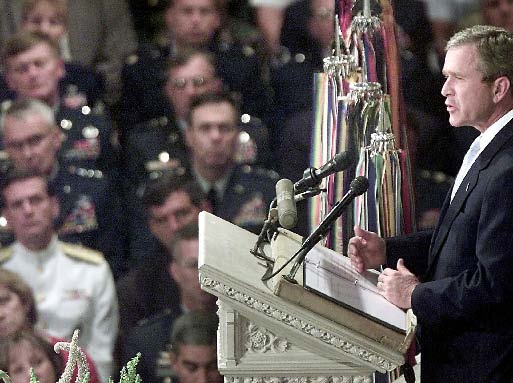
THE MEMORIAL

President's Remarks at National Day of Prayer and Remembrance The National Cathedral Washington, D.C.
We are here in the middle hour of our grief. So many have suffered so great a loss, and today we express our nation's sorrow. We come before God to pray for the missing and the dead, and for those who love them.
On Tuesday, our country was attacked with deliberate and massive cruelty. We have seen the images of fire and ashes, and bent steel.
Now come the names, the list of casualties we are only beginning to read. They are the names of men and women who began their day at a desk or in an airport, busy with life. They are the names of people who faced death, and in their last moments called home to say, be brave, and I love you.
They are the names of passengers who defied their murderers, and prevented the murder of others on the ground. They are the names of men and women who wore the uniform of the United States,
of the United States, and died at their posts.
They are the names of rescuers, the ones whom death found running up the stairs and into the fires to help others. We will read all these names. We will linger over them, and learn their stories, and many Americans will weep.
To the children and parents and spouses and families and friends of the lost, we offer the deepest sympathy of the nation. And I assure you, you are not alone.
Just three days removed from these events, Americans do not yet have the distance of history. But our responsibility to history is already clear: to answer these attacks and rid the world of evil.
War has been waged against us by stealth and deceit and murder. This nation is peaceful, but fierce when stirred to anger. This conflict was begun on the timing and terms of others. It will end in a way, and at an hour, of our choosing. Our purpose as a nation is firm. Yet our wounds as a
people are recent and unhealed, and lead us to pray. In many of our prayers this week, there is a searching, and an honesty. At St. Patrick's Cathedral in New York on Tuesday, a woman said, "I prayed to God to give us a sign that He is still here." Others have prayed for the same, searching hospital to hospital, carrying pictures of those still missing.
God's signs are not always the ones we look for. We learn in tragedy that his purposes are not always our own. Yet the prayers of private suffering, whether in our homes or in this great cathedral, are known and heard, and understood.
There are prayers that help us last through the day, or endure the night. There are prayers of friends and strangers, that give us strength for the journey. And there are prayers that yield our will to a will greater than our own.
This world He created is of moral design. Grief and tragedy and hatred are only for